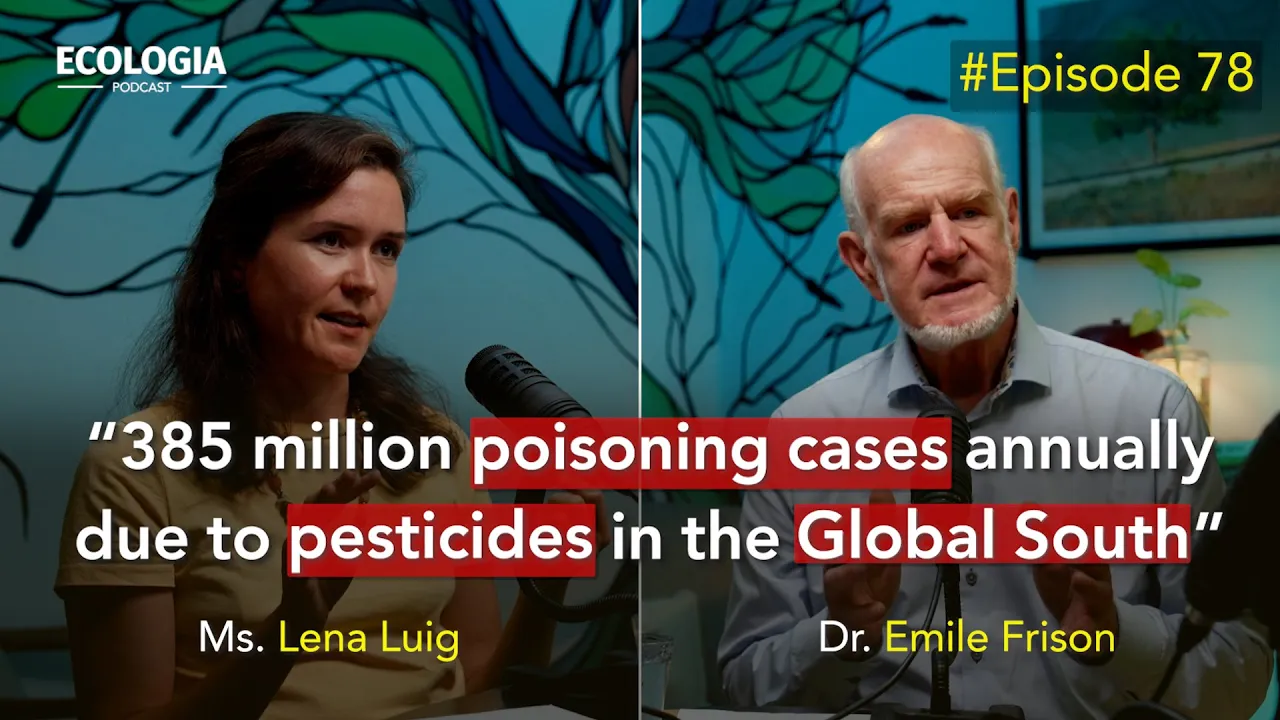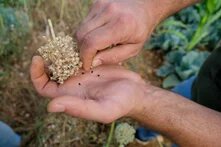In this episode of the Ecologia Podcast, Émile Frison and Lena Luig explore in depth the conditions and levers of an agroecological transition capable of driving lasting change. Hosted by Arafet Ben Marzo.
Ecologia Ep 78 - Dr Emile Frison & Ms Lena Luig | The Agroecology Alternative - Ecologia Podcast
 Watch on YouTube
Watch on YouTube
We invite you to listen to the full episode on YouTube.
Our food systems are on the brink of collapse. Faced with interconnected crises such as climate change, biodiversity loss, and the health impacts of industrial agriculture, simple adjustments are no longer enough to address the challenges ahead. Only a deep, structural transformation can provide real answers.
When the crisis intensifies, the solution must be systemic
Agroecology is emerging as the reference framework for this necessary transformation. More than a set of agricultural techniques, it is a holistic political and social concept that reconnects food production with ecology, local knowledge, and social justice.
In a recent episode of the Ecologia Podcast, Dr. Émile Frison (IPES-Food, Coalition for Agroecology) and Lena Luig (Head of International Agricultural Policy Department – Heinrich-Böll-Stiftung) discussed the evidence, political obstacles, and practical pathways for placing agroecology at the heart of public policies. In this article we want to focus on one of their central messages: the need to act.
The urgency of change: it is not just a matter of production, but above all of power relations
From the outset, Frison shifts the debate from production to the political economy that shapes agriculture. He acknowledges that conventional farming has increased productivity, but at a huge cost: soil depletion, biodiversity collapse, and farmers trapped in debt and dependency on chemical inputs.
“We now have enough evidence that agroecology can be as productive as industrial agriculture, and in some cases even more so,”
says Frison, dismantling the central argument of conventional agriculture’s defenders. For him, the question is no longer whether agroecology works, but why it has so far not been adopted on a large scale.
This means that the blockage is not only technical but rather related to the balance of power.
“Hundreds of millions of dollars are invested every year to influence governments and maintain policies favorable to the industrial model,”
he warns. The real obstacle is therefore not an agronomical on, but a political one.
Beyond Agriculture: The 13 Principles of a Food Systems Revolution
Frison emphasizes that the strength of agroecology lies in its holistic approach. Built on 13 principles—including biodiversity, nutrient cycles, soil health, social equity, and democratic governance—it proposes a redesign of the entire food system, not just farming practices.
“This is not just an application on the field; it is a change of the whole food system up to consumption”,
he insists. This systemic vision distinguishes agroecology from organic farming or other sustainable practices: it is about rethinking the entire chain of production, from seed sovereignty to what ends up on our plates.
This vision is already taking shape through a global coalition for agroecology, uniting governments, farmers’ organizations, Indigenous communities, researchers, philanthropy and civil society. Its mission is twofold: (1) to share proven practices and (2) to build the political momentum needed to redirect policies and funding toward real systemic change.
The Injustice of Pesticides
While Frison lays out the systemic vision for an alternative food system, Lena Luig highlights one of the starkest failures of the current food system: the global pesticide trade. She denounces the glaring injustice of products deemed too dangerous for use in the Global North continuing to be manufactured and exported to countries with weaker regulations, mainly in the Global South.
“It is essential to stress the dimension of double standards in the pesticide trade. What is banned here can be sold elsewhere,”
she argues. This is not just a regulatory gap—it is a matter of justice and global health, exposing farmers, workers and rural communities as well as ecosystems in the South to toxic risks.
She also points out the severe insufficiency of international law:
“The three binding conventions (Basel, Stockholm, Rotterdam) cover around 4 percent of the pesticides sold globally.”
This figure illustrates the inability of existing treaties to cover the full territory and to protect the most vulnerable.
From Evidence to Action: Practical Levers for Transformation
How can political inertia and private interests be overcome? The discussion identifies several concrete levers for scaling up agroecology:
- Public procurement: leveraging the purchasing power of school canteens and hospitals to create stable markets for agroecological products.
- Participatory Guarantee Systems (PGS): community-based certification that builds trust, supports small producers, and energizes local markets.
- Subsidy reform: redirecting public funds from chemical inputs to ecosystem services, training, and knowledge-sharing.
- Legal bans: in particular, prohibiting the export of pesticides banned in the country of origin—a direct response to the double standards denounced by Luig.
By combining these tools, risks for farmers are reduced, reliable markets are established, and a virtuous circle of sustainable production and healthier consumption can take root.
Conclusion: Sowing Politics to Harvest Resilience
The exchange between Émile Frison and Lena Luig highlights a transition pathway that is both necessary and urgent. Scientific evidence robustly demonstrates the benefits of agroecology—social, economic, and health-related. At the same time, the main barriers to its expansion, from industrial lobbying to subsidy structures and unequal pesticide regulations, are clearly identified.
The message is clear: transforming our food systems is both possible and essential. The real battlefield now lies in politics—dismantling harmful incentives, reforming regulations, and building collective power.
Creating resilient, healthy, and just food systems requires coherent and ambitious policies. The foundations of this transformation already exist; what remains is to consolidate and scale them up.

